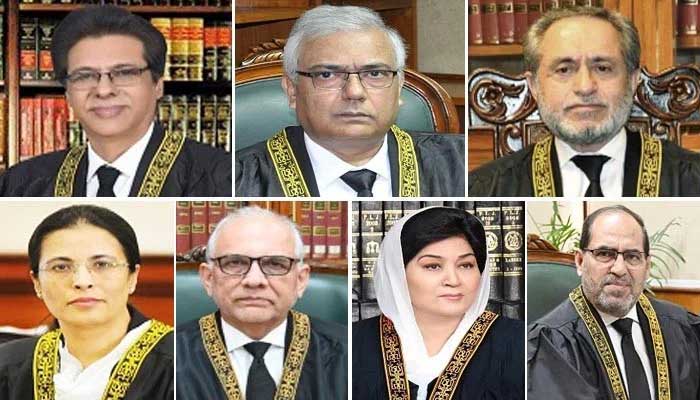
- The Court maintains that the Registrar’s objections to the plea are inadmissible.
- The constitutional judiciary transfers another case to the ordinary judiciary.
- SC rejects petition filed regarding registration of multiple FIRs.
ISLAMABAD: A seven-member constitutional bench of the Supreme Court on Tuesday rejected a petition challenging the extension of the army chief’s tenure.
The bench headed by Justice Amin-ud-Din Khan dismissed the petition for non-execution, while the objections of the SC Registrar’s office regarding the inadmissibility of the plea were also upheld.
The SC bench also includes Justice Ayesha Malik, Justice Muhammad Ali Mazhar, Justice Hassan Azhar Rizvi, Justice Jamal Khan Mandokhail, Justice Naeem Akhtar Afghan and Justice Musarrat Hilali.
The development comes as the ruling coalition earlier this month amended laws – via the Pakistan (Army/Air Force/Navy) Amendment Act, 2024 – that dealt with the three branches of armed forces, extending the fixed tenure of service chiefs. up to five years.
Concerning the retirement age and service limits of service chiefs including the Chief of Army Staff (COAS), Chief of Naval Staff (CNS) and Chief of State -air major (CAS), the bill specifies that the criteria prescribed for senior military officers “shall not be applicable” to the chiefs of the army, navy and air force for the duration of their “mandate of appointment, renewal and/or extension”.
The government also amended Article 8C, which deals with the retirement age, which is 64 years, and service limits of service chiefs.
Several FIRs on one incident
The bench also held a hearing on a case involving registration of two first information reports (FIRs) for a single incident.
During the proceedings, the court declared the request inadmissible and then rejected it.
Justice Mandokhail pointed out that cases like these have contributed significantly to the backlog of 60,000 cases pending in the justice system.
He also noted that the court is repeatedly reminded of this growing number and questioned why the petition should not be dismissed with a sanction.
Addressing the petitioner, who is a lawyer by profession, Justice Mandokhail criticized the filing of such complaints.
Meanwhile, Justice Mazhar referred to the Sughran Bibi case and noted that the court had already ruled on the issue.
He further asked the petitioner why he did not approach the High Court seeking dismissal of the second FIR.
Transfer of cases to the regular bench
A three-member bench, headed by Justice Mansoor Ali Shah, had transferred two cases from the ordinary bench to the constitutional bench.
However, during today’s hearing, the seven members of the constitutional bench decided to refer the case to the ordinary judiciary.
During the proceedings, Justice Ayesha clarified that the petitioner’s lawyer had requested that the matter be referred to the Constitutional Court, and this was done at his request.
Justice Mazhar said not all cases should be referred to the constitutional judiciary, suggesting that cases involving constitutional issues should be the exception.
Along the same lines, a case involving a housing society was also transferred from the constitutional judiciary to the ordinary judiciary. Justice Ayesha noted that cases often move from one jurisdiction to another, highlighting the complexity of such transfers.
The opposing lawyer had requested that the matter be referred to the constitutional court, although the petitioner’s lawyer, Salman Aslam, clarified that he had not made such a request.
